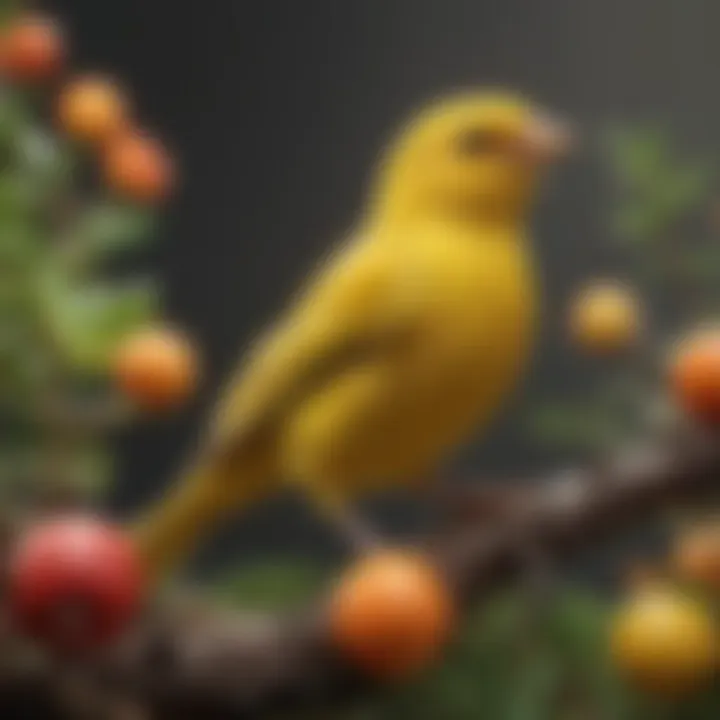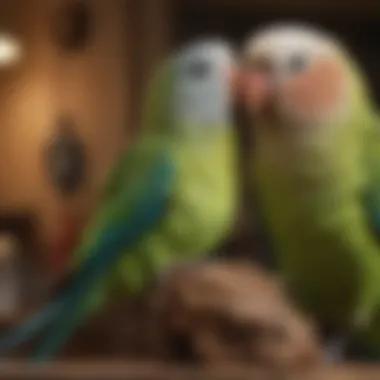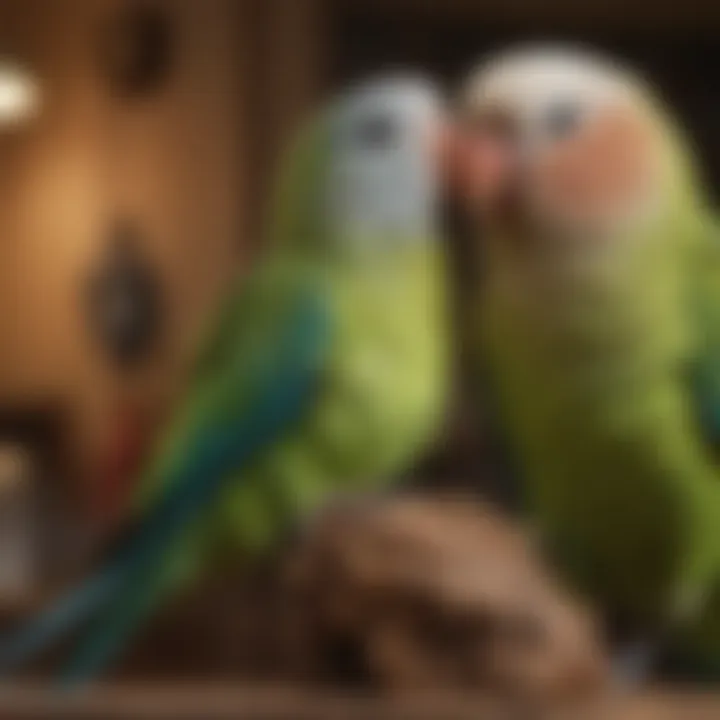Discover the Joy of Caring for Pet Songbirds


Intro
Pet songbirds can fill a home with music and joy, igniting an interest that many don't even know lives within them. Perhaps you’ve been captivated by a particular species, or maybe you're just considering bringing one into your life. Whichever the case, caring for these avian companions is a delightful journey, but it also comes with its own set of responsibilities and challenges. From their diet to their social needs, understanding what it takes to nurture a songbird is crucial.
In this article, we will navigate through the diverse aspects of pet songbird ownership. By delving into essential care practices and exploring the profound bond between birds and their owners, you'll gain insights that enhance your experience as a bird parent. Whether you’re a novice looking for guidance or a seasoned enthusiast wanting to refine your care techniques, this comprehensive guide is designed to support you in every step of your avian adventure.
Avian Care Basics
When it comes to keeping a pet songbird, several fundamentals ensure they thrive in captivity. Below, we’ll touch on the most critical elements that every bird owner should consider.
Importance of Proper Nutrition
Nutrition is the cornerstone of a bird's health. A balanced diet can mean the difference between a chirpy songbird and one that struggles with illness. You should provide a mélange of seeds, pellets, fresh fruits, and vegetables to meet your pet's diverse dietary needs. Remember, each species has its own preferences and requirements. For example, canaries benefit from a seed mix tailored to their needs, whereas parakeets thrive on a varied diet that includes greens.
Keep an eye on portion sizes as well; overfeeding can lead to obesity, which is detrimental to your bird's health.
Understanding Bird Species and Their Needs
Not all songbirds are created equal. It's worth your time to research the specific species you are interested in. Some birds may be known for their melodious tunes, while others may have quirky behaviors that could be endearing or challenging. Cockatiels are known for their affectionate nature while finches can be more independent. Understanding these differences will help shape your care routine.
Basics of Birds Habitat Setup
Creating a safe and stimulating environment is essential for a happy bird. A spacious cage with adequate perches, toys, and hideouts will keep your pet engaged. You may want to place enrichment items like swings or mirrors. Make sure the environment allows for social interaction, but also provides privacy when they want to retreat.
Grooming and Hygiene Tips
Don't overlook grooming. Regular bathing is essential for maintaining your songbird's plumage. A shallow dish of water or a gentle mist with a spray bottle can help them keep their feathers in top shape. Moreover, routine checks on their beak and nails are necessary to prevent overgrowth, which can be uncomfortable or even harmful.
"A well-maintained bird is a happy bird."
Interacting with Your Pet Bird
Just as crucial as physical care is the emotional and psychological well-being of your songbird. Building a strong bond requires time and effort. It’s more than just feeding and cleaning.
Building Trust and Connection
Take the time to earn your bird's trust. Begin your relationship with slow movements and calm tones. Offering treats from your hand can go a long way in showing your intention to bond. It takes patience, but before long, you’ll find your pet looking forward to your presence.
Training Techniques and Tips
Training your bird can be a rewarding process. Introducing basic commands such as "step up" can enhance your interactions and provide mental stimulation. Consistency is key—rewards for good behavior can reinforce positive actions, so consider figuring out which treats your bird enjoys most.
Fun Activities for Bird Owners and Their Birds
Incorporate playtime into your routine. Toys designed for chewing, climbing, and exploring can keep your bird entertained. Interactive games, such as hide and seek with treats, not only stimulate their minds but also strengthen your bond.
Recognizing Bird Cues and Behaviors
Understanding your songbird's body language is fundamental to their happiness. If a bird is puffed up or hiding, it might indicate stress. Likewise, a bird that sings and engages with its surroundings is generally content. Learning these signs contributes significantly to your caregiving ability.
Emotional Well-Being of Birds
Caring for your pet songbird transcends feeding and cleaning; their emotional health is just as important.
The Role of Play and Socialization
Socialization isn’t merely a nice-to-have; it’s essential. Engaging in play with your bird enhances their mood and reduces anxiety. Having multiple birds can also provide companionship, mimicking their social nature in the wild.
Enhancing Birds' Emotional Health
Providing a variety of stimuli including different toys and sounds can enrich your bird's environment. Rotate toys regularly to keep their interest piqued. Interacting with your bird daily not only fosters your relationship but also assists in their emotional stability.
Assessing Bird Stress and Remedies
Recognizing signs of stress is critical. Changes in vocalization, feather plucking, or aggressive behavior can point to anxiety. When noticed, identifying the source—be it environmental changes or a new pet—allows you to remedy the situation more efficiently.
Building Strong Human-Bird Bonds
The relationship between you and your bird will flourish when both parties invest in it. Creating an environment filled with positivity, trust, and love leads to a happier, healthier, and more interactive bird.
Bird Health and Safety
Keeping your bird healthy also means understanding their vulnerabilities and how to mitigate risks in their environment.
Common Health Issues and Prevention
Like any pets, birds are prone to certain health issues. Respiratory infections and feather plucking are common concerns. Regular check-ins on their diet and environment help to spot potential problems early on.
Routine Veterinary Care
Establishing a connection with an avian veterinarian is crucial. Regular health check-ups help ensure your bird is thriving, and vaccinations can prevent illnesses that may arise.
Environmental Hazards to Avoid
The environment must be bird-proofed. Ensure no toxic plants or harmful chemicals are within reach. Typical household items like non-stick cookware can release fumes harmful to birds. Awareness is half the battle.
Signs of Illness or Distress
It's important to keep an eye out for changes in behavior or physical symptoms. Weight loss, lethargy, or changes in droppings can signal a health issue. Early indicators can lead to swift resolution and better outcomes.
Fun Facts and Quirky Insights
Birds have fascinating traits that not just charm us but hold significant meaning culturally and historically.
Unique Traits of Popular Bird Species


Different songbirds come with their own quirks. For instance, budgies are known to mimic speech remarkably well, making them popular choices for those who enjoy interaction. Conversely, finches often have distinctive songs that can be quite melodious.
Historical and Cultural Significance of Birds
Birds have captivated humans for centuries, appearing in lore and legend. Their songs symbolize freedom and, in various cultures, they are deemed messengers of the divine. This cultural significance can deepen the bond between a bird and its owner.
Famous Bird Owners and Their Stories
From Mozart's love for his canaries to John James Audubon’s studies on avian life, many notable figures have celebrated birds. Their stories remind us that the connection between humans and birds is timeless and profound, serving as a testament to the beauty of this companionship.
Understanding the world of pet songbirds is just the beginning. Each section of this article aims to enrich your knowledge and ability to care for these charming creatures while enhancing the connection you foster with them.
Understanding Pet Songbirds
Pet songbirds hold a significant place in the hearts of many, serving not only as companions but also as vibrant elements in our daily lives. These lively creatures bring a symphony of chirps and songs into homes, enriching our environments in unique ways. Understanding them is essential for potential and current bird owners, as it encompasses their nature, needs, and the joy they offer.
The importance of grasping the essence of pet songbirds lies in the responsibilities that come with their care. Each type has its nuances, requiring specific habitats, diets, and attention to thrive. By understanding their behavior and needs, owners can foster environments that encourage healthy interactions and routines, ultimately leading to happier birds.
Defining Songbirds
When it comes to defining songbirds, one must recognize them primarily by their melodic capabilities. Songbirds, or oscine passerines, form an expansive family of birds known for their vocal abilities, including a wide range of sounds from simple chirps to elaborate songs. Their anatomy is specially adapted for song production, featuring a complex vocal organ called the syrinx. This unique structure allows them to create intricate melodies that serve various purposes, such as attracting mates, defending territory, or communicating with flock members.
Common Types of Pet Songbirds
Several species have gained popularity among bird enthusiasts. Each offers distinct characteristics, making them suitable for varying lifestyles and environments.
Canaries
Canaries are perhaps the most celebrated songbirds in homes around the world. Renowned for their bright, cheerful songs, these small birds come in various colors, from vibrant yellows to deep reds. Their ability to sing beautifully makes them a favorite among bird lovers. Not only are canaries visually appealing, but they also require relatively low maintenance, which adds to their popularity.
A unique feature of canaries is their strong connection to singing competitions. Owners often train them to reach specific song patterns, emphasizing their auditory prowess. However, it's worth noting that their singing can vary based on individual personalities, which could lead to some unexpected surprises in the auditory department.
Finches
Finches are another lively choice for companion birds. Known for their charming appearance and cheerful personalities, these birds are often seen flitting around in aviaries. Finches are social creatures that thrive in pairs or groups, providing a continuous display of activity and companionship, which can be beneficial for the bird's psychological health.
Moreover, finches have a variety of songs, though less melodious than canaries, their chirps still add a pleasant background noise to daily life. They are relatively hardy birds, making them an excellent option for beginners, though especially delicate finch varieties require more attentive care.
Budgerigars
Budgerigars, commonly referred to as budgies, are incredibly popular among pet owners for their sociable nature. These small parakeets are known for their playful demeanor and striking plumage, coming in various colors like blue, green, and yellow. A defining characteristic of budgies is their ability to learn to mimic sounds and even human speech, which brings a fun layer of interaction to their companionship.
Despite their playful charm, budgerigars require regular mental stimulation and social interaction. While they can adapt well to single living situations, they truly flourish when kept with other budgies or compatible bird species. Their energetic nature does mean that potential owners should consider the space needed for them to fly and frolic.
Cockatiels
Cockatiels stand out with their charming crests and affectionate attitudes. These birds are known for their friendly natures and adaptability, making them popular choices for families and individuals alike. A remarkable aspect of cockatiels is their diverse range of vocalizations, from sweet whistles to playful screeches.
One of the unique features of cockatiels is their exceptional capacity for bonding with their owners. They often express affection through gentle nips or snuggling, fostering a close relationship. However, potential cockatiel owners should note that, while they can be independent, they require plenty of social interaction and mental engagement to prevent boredom and potential behavioral issues.
Unique Traits of Songbirds
Pet songbirds exhibit a range of unique traits that cater to the aesthetic and emotional experiences of their owners. Each species, while having its individual quirks, contributes to a shared experience of joy and companionship. They don’t just fill a home with sounds; they become part of the family dynamic, reminding us of nature's beauty and complexity.
Understanding these unique traits assists owners in creating environments where these melodious creatures can thrive, ensuring that both birds and humans enjoy a harmonious existence.
The Companionship of Songbirds
The companionship provided by pet songbirds is one of the most compelling reasons people choose to invite these feathered friends into their homes. Unlike many other pets, songbirds possess a unique charm that entices owners to cherish and nurture them. With their melodic songs and vibrant personalities, these creatures offer a companionship that can be both fulfilling and deeply rewarding. Understanding the emotional connections, the importance of socialization, and the need for interaction and play are crucial in cultivating a thriving relationship with these birds, ultimately enriching both their lives and yours.
Emotional Connections
Pet songbirds are more than just chirping companions; they can form deep emotional bonds with their owners. This connection often stems from the consistent care and attention that a bird receives. For instance, a budgerigar that receives regular handling may become very affectionate, often greeting its owner with cheerful chirp when seeing them. By recognizing their unique personalities, it's possible to foster a sense of trust and loyalty, encouraging a rewarding interactive experience.
Birds such as canaries and finches also show signs of emotional responsiveness. Observing your songbird's behavior can reveal how they feel about your presence. A bird that sings joyfully when you're near likely feels secure and cherished. Similarly, a cockatiel that enjoys being petted or scritched under the wings exhibits a level of comfort and attachment that speaks volumes about their emotional state.
"The bond between a songbird and its owner is like a silent conversation, communicated through songs and behaviors."
Importance of Socialization
Socialization for pet songbirds is essential, as it plays a pivotal role in their overall well-being. Birds are inherently social creatures, and isolation can lead to stress and behavioral issues. It's crucial to introduce your songbird to various experiences, environments, and, yes, even other pets or family members, to ensure they develop healthy social skills.
Just as children need social interaction for proper development, songbirds thrive on engagement. Regularly spending time interacting with your bird during its waking hours helps reinforce its comfort with humans. Try using positive reinforcement techniques by offering treats or praise when they respond positively to your presence. This nurtures an affectionate relationship that goes both ways.
Interaction and Play
Interaction and play are paramount in fostering a happy, healthy pet songbird. Birds are intelligent beings and require mental stimulation. Simple activities such as providing toys, rotating them frequently to maintain novelty or introducing foraging opportunities can make a world of difference in their enrichment.
Having a safe space to play is just as important. Consider creating a dedicated area where your bird can explore new toys or perches without the confines of a cage. This not only encourages physical activity but also allows birds to exhibit natural behaviors, like climbing and exploring.
Some simple recommendations for interactive play include:
- Interactive Toys: Puzzle toys that require them to figure out how to retrieve a treat.
- Training Sessions: Teaching basic commands can be a fun way to keep their minds engaged.
- Social Play: If comfortable, allow your bird to interact with other pets or family members, under supervision.
In sum, the companionship of songbirds enriches both their lives and ours. Cultivating emotional connections, emphasizing the value of social interaction, and encouraging playful engagement are all vital components in creating a fulfilling and harmonious bond. The interaction forged through these practices isn't just light-hearted chirps; it becomes a lasting relationship that resonates deeply, benefiting both bird and owner.
Setting Up the Environment
Creating a suitable environment for pet songbirds is not just a matter of aesthetics; it's a requirement for their physical and mental well-being. A well-thought-out space allows these creatures to thrive, helping to foster their ongoing health while also enhancing the bond between bird and owner. The nuances of this setup can significantly influence behaviors, moods, and overall happiness. Understanding these elements is vital for both seasoned bird lovers and new adopters alike.
Choosing the Right Cage
The cage serves as the foundation for your songbird’s environment. When selecting a cage, it's important to consider size, material, and configuration. Ideally, the larger the cage, the better, as it provides room for movement and exercise. As a general rule of thumb, the cage should be at least twice the wingspan of your bird in width and height. This generous space allows them to stretch their wings fully and prevents feelings of confinement.
Material matters too; opting for non-toxic, durable materials like stainless steel can be beneficial as songbirds tend to nibble on their surroundings. Sufficient bar spacing is another crucial detail; bars that are too wide can pose a risk of escape or injury. Also, something to ponder is the layout of the cage itself. Horizontal bars can help birds hop and climb, promoting physical activity, while perches of varying sizes and textures can encourage natural behavior.


Bedding and Accessories
Bedding is often overlooked, yet it plays an essential role in your bird's health. Bedding material should be absorbent and safe, such as paper pellets or aspen shavings, which help maintain hygiene by controlling odors and moisture. Avoid cedar shavings as they can contain oils harmful to birds.
Accessories should also be thoughtfully selected. Providing various perches, toys, and even a bathing area can enrich their environment. For instance, perch placement should vary in height and diameter to promote foot health. Toys that stimulate their natural foraging instincts are likewise crucial. Hiding treats in foraging toys can give your songbird some engaging challenges; something as simple as crumpling up a treated paper towel can lead to hours of exploration.
Establishing Play Areas
Beyond their cages, songbirds benefit immensely from additional play areas. Crafting a safe, dedicated play space encourages not only physical activity but also mental stimulation. You might want to consider a bird-safe play gym, equipped with climbing structures and perches away from their day-to-day environment.
Once you've designated an area, let creativity flow; you can incorporate items like swings or mirrors to create a diverse experience. A safe outdoor environment can also be rewarding, assuming precautions are taken to protect against sudden weather changes or predatory threats. Notably, these play areas are crucial for bonding as they allow for interactive times between pet and owner.
"A thriving bird is one that feels comfortable, secure, and engaged in their environment."
This encapsulates the essence of setting up an environment that accommodates your songbird's needs and promotes a lifetime of enjoyment and companionship.
Diet and Nutrition
Providing the proper diet and nutrition for pet songbirds isn't just a matter of choice; it's an essential part of ensuring their well-being and longevity. These feathered companions have distinct nutritional requirements that vary significantly from traditional pets like dogs or cats. A thoughtful approach to their diet can increase their lifespan, improve their overall health, and lead to a more vibrant and active pet.
Understanding Nutritional Needs
Songbirds require a balanced diet that includes carbohydrates, proteins, fats, vitamins, and minerals. Just like humans, these creatures thrive on a varied diet. Each component serves a specific role:
- Carbohydrates are involved in energy production for daily activities.
- Proteins are crucial in tissue repair and growth, especially in young birds.
- Fats provide essential fatty acids that are vital for skin and feather health.
- Vitamins and minerals support numerous bodily functions including immune response and bone health.
It's important to observe your songbird's individual needs and adjust their diet accordingly. Factors like age, species, and overall health play a vital role in determining what should make up their daily meals.
Types of Food for Songbirds
Diversity in diet isn't just good for health; it also keeps feeding time interesting for your songbird. The following are common types of food options:
Seeds
Seeds are often the go-to choice for many bird owners. They offer a range of flavors and textures, which can stimulate a bird’s foraging instincts. However, seeds shouldn’t be the sole part of a pet songbird's diet. While they are rich in fats and oils, overfeeding seeds can lead to obesity and other health issues.
One key characteristic of seeds is their high energy content. This makes them a popular choice among pet owners. Seeds like sunflower and millet are well-loved by many species. It's best to offer a variety, ensuring birds have a chance to explore and enjoy different tastes.
Unique features about seeds include their long shelf life, making storage quite convenient for pet owners. The downside, though, hinges on their nutritional imbalance if they become the dominant food source.
Pelleted Diets
Pelleted diets offer a well-rounded formula that is designed to meet all the nutritional needs of your songbird. Unlike seeds, pellets contain a mix of grains, vitamins, and minerals that contribute to a bird’s overall health.
The key characteristic here is the balance; each pellet is created to provide specific nutrients in appropriate amounts. For busy pet owners, this type of diet simplifies feeding and the need to monitor ingredient variety.
However, some birds resist transitioning to pellets, preferring their familiar seeds. Tolerance and gradual introduction can help overcome this issue. Another downside to pellets is the potential for spoilage if left unattended too long in humid environments.
Fresh Fruits and Vegetables
Fresh fruits and vegetables are a treasure trove of vitamins, fiber, and hydration for songbirds. They're an excellent supplement to either seeds or pellets, and the colorful presentation can be visually stimulating for your pet.
The key advantage of incorporating fresh produce is the added hydration, especially for species that struggle with fluid intake. Varieties like apples, peas, and leafy greens offer a delightful crunch and a spectrum of flavors, keeping mealtime lively.
On the flip side, not all songbirds will eagerly accept fruits and veggies at first. They may require some time to get accustomed to these new tastes. It's also essential to wash produce thoroughly and avoid any pesticides that could harm your pet.
Hydration and Supplements
Keeping your songbird hydrated is just as important as providing the right food. Clean, fresh water should always be available. Offering a shallow dish that they can easily access is helpful.
While fresh fruits often add water content, many songbirds might still need additional hydration. Consider adding small doses of supplements, such as calcium or specific vitamins, if recommended by a vet, especially during times of stress or dietary changes.
In summary, a thoughtful approach to diet and nutrition for pet songbirds includes understanding their needs, providing a variety of foods, and ensuring proper hydration. With the right care, these beautiful creatures can thrive, bringing joy and song into your home.
Health and Well-being
Caring for pet songbirds extends beyond providing food and companionship; it encompasses their overall health and well-being. A healthy bird not only sings beautifully but also enjoys a longer, more active life, which in turn enhances the quality of companionship we share with them. Understanding health-related issues is crucial for any bird owner. Regular check-ups, a balanced diet, and an enriched environment play pivotal roles in ensuring that these delightful creatures thrive.
Common Health Issues
When it comes to songbirds, several health issues can arise. Knowing what to watch for can lead to early detection and treatment. Here are some common problems:
- Obesity: Often caused by a diet too high in seeds, obesity can lead to other serious conditions like heart disease.
- Feather plucking: This behavior, often resulting from stress, boredom, or a lack of stimulation, can cause physical harm and lead to infections.
- Respiratory infections: Birds are prone to these due to poor living conditions or exposure to irritants like smoke or strong odors.
- Gout: This painful condition often stems from an excess of protein in the diet, building up uric acid in the blood.
"An ounce of prevention is worth a pound of cure," applies aptly to avian health. Keeping an eye on behaviors and dietary habits can save a bird’s life.
Preventative Care
Preventative care is your best ally in maintaining your songbird's health. Here are some key elements to consider:
- Regular vet check-ups: It's wise to schedule health assessments at least once a year. Vets who specialize in avian care can provide insights tailored to your bird species.
- Balanced diet: Ensuring a varied diet with appropriate seeds, pellets, fresh fruits, and vegetables supports their nutritional needs.
- Clean environment: Regularly cleaning the cage, removing waste, and monitoring for mold or mildew can prevent many health issues.
- Mental stimulation: Engage your birds with toys, perches, and social activities to keep them mentally sharp and less prone to stress.
When to Seek Veterinary Assistance
Recognizing when a songbird needs professional help boils down to attentiveness. Here are some signs that should prompt a trip to the vet:
- Changes in vocalization: If your bird suddenly stops singing or changes the tone significantly, it might indicate discomfort or illness.
- Appetite changes: A sudden drop in food intake or a shift in eating habits can signal health issues.
- Show of lethargy: Birds that are less active or sitting at the bottom of the cage may be unwell.
- Visible distress: Signs like labored breathing, excessive droppings, or feather loss warrant immediate veterinary attention.
Being proactive about health and well-being can significantly enhance the lifespan and happiness of your songbird. We owe it to these vocal companions to provide the best care possible.
Behavioral Insights
Understanding the behavioral landscape of pet songbirds is a crucial aspect that informs their care and enhances the relationship between birds and their owners. The intricate behaviors these creatures exhibit serve as windows into their well-being, emotional states, and overall health. By being attuned to these behaviors, owners can not only recognize when their birds are thriving but also identify when something might be amiss. This proactive approach can significantly impact the avian companions' quality of life.


Understanding Bird Behavior
At the heart of providing optimal care is a grasp of how birds act and communicate. Songbirds, like canaries and finches, often display a range of behaviors that are innate to their species. These behaviors include
- Singing to establish territory
- Preening feathers, which is vital for plumage maintenance
- Foraging for food, an instinctive action that mimics their wild habits
- Engaging in social interactions, whether it’s calling out to a mate or interacting playfully with their human counterparts.
Understanding these varying behaviors helps owners create a nurturing environment. An active and engaged bird is often a happy one, and taking the time to observe and interpret these actions can deepen the bond between pet and owner.
Signs of Stress and Anxiety
Just like humans, songbirds can experience stress and anxiety that manifest through altered behaviors. Recognizing these signs is crucial for timely intervention. Some indicators include:
- Excessive vocalization: If a bird suddenly becomes louder or more vocal without any apparent stimulus, it could be a sign of distress.
- Feather plucking: This behavior can be indicative of stress or boredom. It’s essential to address the underlying cause swiftly.
- Lethargy: A noticeable reduction in activity may signal that the bird is feeling unwell or stressed.
- Aggressive behavior: Changes in temperament, including biting or aggressive displays, often indicate discomfort or fear.
"A stress-free environment leads to happy songbirds, and happy songbirds fill our homes with melodious tunes."
Being observant and responsive to these behaviors provides birds with a comforting sense of security, allowing their true personalities to shine through.
Promoting Positive Behavior
Promoting well-adjusted behavior in songbirds is not merely about implementing rules; it’s about creating an enriching environment that stimulates their curiosity and natural instincts. Here are some practical strategies:
- Engagement with toys: Offer various toys, such as bells, mirrors, and chewable items, to keep your bird mentally challenged and entertained.
- Social Interaction: Spend time talking or playing gently with your bird. Socialization promotes confidence and reduces anxiety.
- Mimicking natural environments: Create a space that resembles their natural habitat, with proper perches, nesting boxes, and places to explore. This encourages instinctual behavior, fostering a sense of safety.
- Positive reinforcement: Train using small treats to encourage desired behaviors, making learning an enjoyable experience for both you and your bird.
Integrating these insights into daily routines can lead not only to happier birds but also to a rewarding relationship built on trust and understanding. Attention to behavioral cues lays the groundwork for a lasting companionship that enriches both the pet and the owner.
Training and Enrichment
Training and enrichment make the world of pet songbirds more vibrant. Not just a luxury, these practices are essential for their mental and physical health. Understanding the nuances of training your songbird can lay the groundwork for a harmonious life together.
Benefits of Training
Engaging in training helps bolster the bond between you and your feathered companion. When birds learn basic commands or tricks, it fosters communication, making them feel more secure in their environment. Here's what training brings to the table:
- Enhanced Communication: Learning cues helps the bird understand your expectations. This can reduce anxiety for both of you.
- Mental Stimulation: Songbirds are intelligent creatures. Training keeps their minds sharp, staving off boredom that could lead to problematic behaviors.
- Strengthened Bond: As you spend time teaching your bird, trust and affection deepen. The connection becomes less about owner and pet and more about companions.
Basic Commands and Tricks
Instilling simple commands in a songbird doesn’t have to feel daunting. A few straightforward strategies can lead to meaningful results:
- Choose Short Commands: Birds respond well to short and clear commands like "Come" or "Stay." Use a firm yet gentle tone.
- Use Positive Reinforcement: Whenever your bird successfully follows a command, offer a treat or praise. This encourages them to repeat the behavior.
- Be Patient: Just like humans, birds need time to learn. Some may catch on quickly, while others might take longer.
Engaging Activities for Songbirds
To keep your songbird entertained and stimulated, introduce a variety of engaging activities:
- Puzzle Toys: Consider toys that challenge their problem-solving skills. These can mimic foraging, which is natural behavior for birds.
- Flight Time: Allowing your bird to fly safely in a controlled space promotes exercise and reduces stress.
- Interactive Training Sessions: Use these moments to teach tricks or reinforce commands. Keeping sessions short will keep your feathered friend interested.
Remember: Regularly rotate toys and challenges. This keeps the bird’s environment fresh and intriguing, fostering continual happiness and learning.
Ultimately, training and enrichment are not just about teaching your songbird to respond. They're about building an enriching life for both you and your feathery friend. The right balance of commands and interaction encorages a fulfilling companionship.
Creating a Harmonious Home
Creating a harmonious home for your pet songbirds is not merely an intermediary step in pet ownership; it's a commitment that enhances the overall experience for both the bird and the human. An environment that fosters tranquility and stimulation can significantly influence a bird's mood, behavior, and health. It’s like setting the stage for a delightful ongoing performance.
Coexistence with Other Pets
When merging a songbird into a household with other pets, the dynamic can be tricky. Each pet brings its personality and needs, so careful consideration is key. First off, it's crucial to assess the temperament of the other animals. For instance, dogs and cats may instinctively have a prey drive, and their presence can stress a songbird.
- Create Safe Spaces: Establish separate zones for your songbird, ideally a quiet room where they feel secure. This space should be off-limits to other pets.
- Leverage Visual Barriers: Use dividers or furniture to create visual barriers. This strategy can reduce the bird's stress, giving them a sense of safety.
- Supervised Interactions: If you choose to allow interactions between your bird and other pets, do so under supervision. This can involve gradually introducing them while keeping them safe, noting any signs of distress from the bird.
Promoting a peaceful coexistence ensures that each pet can express themselves without fear, leading to a more harmonious household.
Family and Friends Interaction
Having family and friends over can stir up excitement in the home, but for your songbirds, it can be a source of anxiety. Birds are creatures of routine and overexposure to unknown elements can lead to stress.
- Establish Rules: It's critical to have clear guidelines on how visitors should interact with the birds. Many guests may not know the right way to handle or speak to your feathered friend.
- Limit Access: Consider allowing your birds to remain in their safe space when friends come over, particularly if they tend to be skittish. Let your guests know that patience is key when trying to build rapport with your songbird.
- Encourage Calm Behavior: Teach family members to engage with the birds calmly, avoiding sudden movements or loud noises. Even soft music can provide a soothing atmosphere, thus allowing both your pets and guests to feel comfortable.
This thoughtful approach helps nurture a positive interaction experience for your songbirds, ensuring every gathering is enjoyable for all.
Establishing Household Routines
Establishing household routines can help create a predictable environment, which is crucial for songbirds. Birds thrive on routine as it provides them with a structured day to anticipate their needs being met.
- Feeding Schedules: Stick to consistent feeding times. Birds often feel more secure when they know when to expect their meals. Singing or chirping around meal times can even become a bonding moment.
- Playtime Rituals: Developing a daily playtime routine helps enhance their social skills and promotes physical well-being. Interactive toys or perch time outside their cage will encourage exploration and interaction.
- Quiet Time: Like all creatures, songbirds also benefit from a little downtime. Setting aside periods of quiet can help prevent overstimulation, allowing them to rest and recharge.
By creating a consistent routine, your songbirds will flourish, bringing joy and a sense of companionship into your life.
Embracing these practices not only strengthens the bond with your feathered companions but also enhances their happiness and well-being.
Understanding Lifespan and Aging
Understanding the lifespan and aging of pet songbirds is crucial for any bird owner. It's not just about knowing how long these delightful creatures can live; it's about preparing for each stage of their lives and the shifts in care they require. Just as people go through life stages, so do birds. Each phase—from chirpy juvenile to wise old-timer—has its own needs and nuances. A keen awareness of this can enhance the bond between bird and owner, ensuring a comfortable and enriching life for the feathered companion.
Lifespan of Common Songbirds
When considering pet songbirds, one may find varying lifespans based on species, environment, and care. Some of the most popular species among pet owners include:
- Canaries: Typically live for about 10 to 15 years. They are known for their vibrant colors and melodious tunes.
- Finches: These energetic little birds average about 5 to 10 years, depending on species and care.
- Budgerigars (Budgies): Budgies can live for 5 to 15 years with optimal care, making them popular companions.
- Cockatiels: These affectionate birds often enjoy a lifespan of 10 to 15 years.
The variation is influenced by factors like diet, living conditions, and overall health care. A bird's longevity is not just a measure of time but reflects the quality of life provided by the owner.
Aging Signs in Pet Birds
Recognizing the aging signs in pet songbirds is essential for responsible ownership. Common indicators include:
- Changes in Activity Level: Older birds may become less active or show reluctance to play.
- Feather Condition: Deterioration in feather quality—loss of luster or increasing bald patches—can be a sign of aging.
- Changes in Vocalization: A decline in singing or chirping can indicate that a bird is aging or possibly having health issues.
- Altered Eating Habits: Appetite might diminish as birds age, which could signal dental or metabolic issues.
Noticing these signs early allows owners to adjust care routines or seek veterinary advice promptly, ensuring that their companions remain comfortable and healthy.
Coping with End-of-Life Decisions
Facing the end-of-life phase for a beloved songbird is a challenging emotional journey for any owner. Here are some considerations that can make this difficult time a bit easier:
- Quality of Life Assessments: Regular evaluations of your songbird's well-being can help recognize when intervention may be needed.
- Discussing with a Veterinarian: Consulting with an avian vet can solidify a care plan and address any treatment options available.
- Making Peace with Decisions: It's vital to prepare mentally for the choice to alleviate suffering. Transitioning to palliative care or considering humane euthanasia can be heart-wrenching but sometimes necessary.















